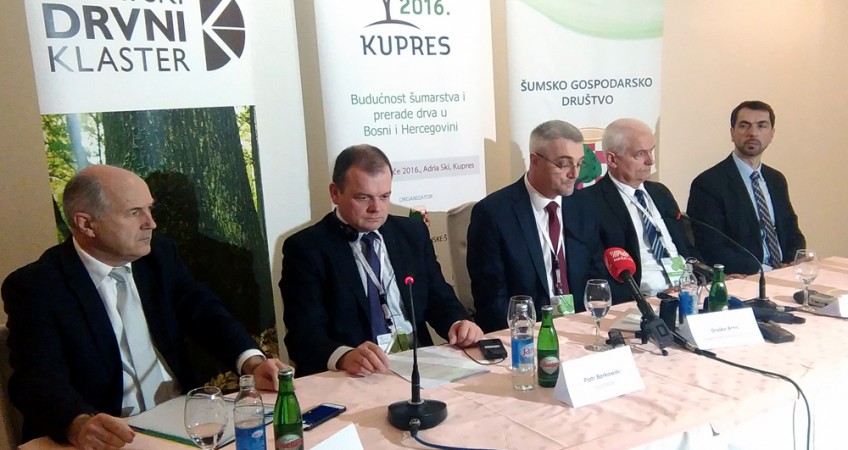Check against delivery.
Kupres, 25 February 2016
Ladies and Gentlemen,
It is my great pleasure to be with you here today in Kupres and to have the opportunity to participate in a conference that I sincerely hope will accelerate the development of one of Bosnia and Herzegovina’s most prospective sectors of the economy – forestry and timber processing.
With representatives of business and government at the relevant levels present here today, this is the time for us all to recommit to taking the steps needed to finally unlock the full potential of the sector, to open up new opportunities and jobs.
However, if opportunities are to be realized and the potential of this key sector of the economy is to be realized we will need to redouble our efforts and we will need to ensure a far higher degree of order than we currently have.
The potential for increased market access and economic opportunities is clear to us all so let us work together to finally regulate the forestry sector in a way that will achieve this.
With a readiness to make healthy compromises and to work together, this country can go a very long way.
In the Federation, 58 percent of the territory is forest and woodlands. The timber processing sector is extremely active and profitable in this canton and others, contributing to cantonal and Federation budgets.
However, we all know the current situation is not satisfactory.
The forestry sector has a cloud hanging over it, not least as the Federation has been without a comprehensive forestry law since 2009.
I repeat, since 2009.
The adoption of a Federation Forestry Law is not only a matter of urgency to facilitate development of this important sector of the economy, but it is also a seven year old legal obligation to implement the 2009 ruling of the Federation Constitutional Court.
As many of you are also aware, while the cantons have adopted their own forestry laws, they are not consistent from canton to canton. The lack of legislation and oversight of the forests and woodlands at the Federation level endangers the protection and the preservation of these areas. This is not sustainable.
Under the current circumstances, an estimated 1 million square meters of wood are lost to illegal logging each year.
Meanwhile, there is almost no salvage logging or culling of infected trees.
Moreover, neither the entity nor the state has preventative measures in place against damage from invasive pests, or a continuous system of monitoring the health of forests, as other European countries do.
The risks of this situation are well known to you all. They are potentially very serious. In the worst case, having in mind that forests are an interconnected ecosystem, this leaves not only the Federation, but the entire country, vulnerable to a catastrophic die-off of tree species, and even entire forests.
Financially, the lack of comprehensive legislation results in the under-collection of fees, which would be of primary benefit to local governments and local communities. From 2003 to 2008, the Federation budget received approximately 2.7 million KM per year and the cantons approximately 10.1 million KM per year from forestry-related fees.
However, according to the Federation Forestry Directorate, properly applied and collected fees could amount to 30 million KM annually, more than double the current revenue, of which 24 million would go to the cantonal budgets.
Let’s take the action that is necessary to change this situation and in so doing let’s increase much needed public revenues.
I mentioned the beautiful natural resources of Bosnia-Herzegovina, but I did not mention its most important resource, its people.
Ultimately this is about them and the pressing challenge we face to create the opportunities and jobs that are necessary to keep citizens here, in this canton and in this country.
Ladies and Gentlemen, “brain drain”, the loss of many good hardworking citizens must be addressed and it must be addressed urgently. The problem is particularly acute in this canton, with dozens of families leaving each month. Not only can we stop this negative trend, we can even reverse it in due course if we bring in new investments that lead to more of the skilled jobs that are central to the modern production of furniture and other final products made of wood.
We can only do this if we create a functioning framework for this sector of the economy to develop. So I repeat: let us as an urgent priority enact legislation to protect the forests and woodlands of this country, to address the problems of illegal logging, and to establish a forestry health monitoring system.
This would not only provide investors with greater confidence in the market, leading to increased employment opportunities, it would also increase profits for local companies, and raise revenues for authorities at all levels.
So, I would encourage you to use the opportunity of this conference to urge your political representatives in the Federation – particularly the Federation Government and Parliament to accelerate the adoption of a modern and comprehensive forestry law.
Ladies and Gentlemen, it is time to make a breakthrough and to put this country back on track.
Efforts to put this important piece of legislation in place have my full support and I look forward to visiting the businesses, including in this canton, that will undoubtedly open up once this law is adopted.
Thank you.














